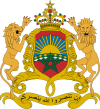- Makhzen
-
Morocco 
This article is part of the series:
Politics and government of
MoroccoConstitutionMonarchy- King
- Makhzen
GovernmentJudiciaryDivisions- Administrative divisions
- Regions
- Provinces
- Wilayas
ElectionsForeign policy
Makhzen (Moroccan Arabic: مخزِن) is the governing elite in Morocco and in pre-1957 Tunisia, centered around the king and consisting of royal notables, businessmen, wealthy landowners, tribal leaders, top-ranking military personnel, security service bosses, and other well-connected members of the establishment.
Contents
Etymology
The word makhzen literally means "warehouse" (from ḵazana ‘store up.’[1]), where the king's civil servants used to receive their wages; but this usage of the word became in Moroccan Arabic synonymous with the elite. It is likely a metonymy related to taxes, which the makhzen used to collect; the term may also refer to the state, but this usage is increasingly rare and is primarily used by the older generation. Recently, the term is also being used to describe the police.
The word has also been adopted into Spanish, Portuguese with a different meaning, as almacén and armazem (with addition of the Arabic article al-), and into French and Italian as magasin (meaning "store") and magazzino. It came into the English language from Middle French as magazine, originally referring to a storehouse for ammunition and later to publications.
Makhzen in Morocco
The Makhzen is a very ancient notion in Morocco, it roughly coincides with the notion of the ancien feudalist state predating The French protectorate. Resident-General General Lyautey (in office 1912-25) a fervent proponent of indirect colonisation, especially in Berber-speaking areas, kept that role and even enhanced it by given an important role to local notables such as T'hami El Glaoui, to act as a relay between the population and the French authorities to govern the country.
References
- ^ NOAD
See also
- Auxiliary Forces (Mokhzani)
Categories:- Politics of Morocco
- Arabic words and phrases
- Human rights in Morocco
Wikimedia Foundation. 2010.
